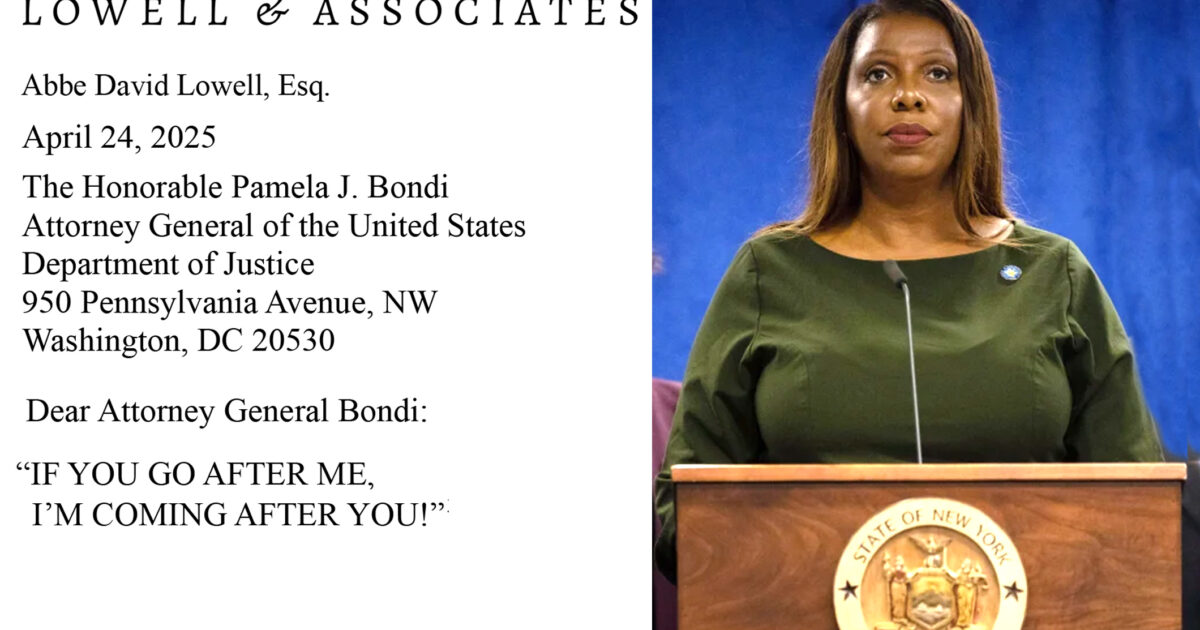Guest post by Joel Gilbert
“Everyone knows those allegations are baseless, they’re discredited,” New York Attorney General Letitia James confidently answered a man who asked her about mortgage fraud charges.
If James believes her attorney’s public letter “discredited” anything, it’s wishful thinking.
In an April 24 letter to U.S. Attorney General Pamela Bondi, high-profile Democrat defense attorney Abbe Lowell laid out his of defense of Letitia James in response to a criminal referral filed by U.S. Federal Housing Director William Pulte.
Lowell has represented Hunter Biden and Bob “Gold Bar” Menendez. The referral alleges potential mortgage fraud and campaign finance violations.
Lowell’s entire letter to Bondi smacks of a public relations stunt, rather than a legal defense, as Lowell portrays the DOJ referral as an act of political vengeance by Donald Trump.
While that argument may hold weight in the court of public opinion, it is legally irrelevant unless there is evidence of selective prosecution or denial of due process. Investigations and referrals must be evaluated based on evidence, not motive.
When Lowell does attempt to make legal arguments, they are substantially flawed.
In several areas, Lowell downplays or ignores critical facts, mischaracterizes the legal standards involved, seems to misunderstand public documents, and focuses heavily on political optics rather than addressing the alleged statutory violations.
1. Mischaracterization of the Virginia Primary Residence Issue
One of the central allegations in the criminal referral is that Letitia James falsely claimed a property in Norfolk, Virginia would be her “primary residence” in mortgage documents in 2023, as detailed by forensic accountant Sam Antar on his White Collar Fraud website.
Lowell claims that a two-week-old email from Letitia James stating the Virginia property “WILL NOT be my primary residence” overrides a signed power of attorney and loan documents submitted later declaring it as her “principal residence.”
The designation of a property as a “principal residence” on official loan documents is not trivial. It affects underwriting criteria, risk evaluation, interest rates, and insurance rates.
The power of attorney was signed, notarized, and submitted at closing – its designation carries legal weight.
That James may have made contrary statements in informal emails does not nullify what she or her representative attested to under penalty of perjury in the signed mortgage forms. Courts and investigators would prioritize final loan filings over informal statements when assessing fraud.
2. Brooklyn Four-Unit Building Claim Contradicted by Official Certificate of Occupancy
A second allegation concerns a 2011 federal HAMP (Home Affordable Modification Program) mortgage obtained by James on her Brooklyn brownstone. James represented in that application that the building contained only four apartment units – thus qualifying her for the loan program.
However, the official Certificate of Occupancy (C of O) lists five units, and the HAMP program was restricted to buildings with four or fewer legal units.
Lowell claims that, despite the 5-unit C of O, the building has always functioned informally as a four-unit residence and points to NYC Housing Preservation and Development (HPD) records that classify the property as having only three stories and four units.
First, Lowell’s argument fails to recognize that the legal unit counts on the Certificate of Occupancy, which is what determines eligibility for programs like HAMP, not a claim of how the space is used informally.
Nor does Lowell address James’s misrepresentation of a financial hardship in qualifying for the HAMP loan, this despite James earning around $ 14,000 per month at the time she successfully got the government to provide her with a 2.7% loan to replace her adjustable 10% rate mortgage.
Second, Lowell fails to understand that New York City’s HPD classification was created by Letitia James herself. It is based solely on her yearly registration submission, whereby James falsely claimed her building had only 3 stories and 4 apartment units, when it legally had 4 stories and 5 apartment units.
3. Minimization of Fraud Risk in the “Husband and Wife” Mortgage Filing
Another allegation in the DOJ referral is that Letitia James, in 1983 at age 24, co-signed a mortgage loan with her father, Robert James, listing themselves as “husband and wife.”
Lowell asserts that her father filled out the forms and made a mistake. However, the “husband and wife” designation appeared in multiple documents across several years, including the original mortgage’s main page, its signature page, the assignment to a new lender months later, and the deed upon resale of the property by Letitia James in 2000.
Lowell’s explanation is simply legally inadequate. Both Robert and Letitia James signed the documents attesting to the spousal relationship. Letitia had a duty to read and correct them before signing.
Why didn’t she do so even as an attorney in 2000, rather than selling the property under the “husband and wife” designation?
Misrepresenting a relationship on mortgage documents in order to obtain favorable loan terms – particularly to appear as a married couple with joint financial responsibility – can constitute mortgage fraud under both state and federal statutes.
4. Failure to Address Campaign Finance Violations and Nonprofit Coordination
Lowell’s letter is most conspicuously silent on one of the most serious allegations: that James’s 2013 Public Advocate campaign paid a 501(c)(4) nonprofit, New York Communities for Change (NYCC), for direct campaign services, including canvassing and staffing.
IRS regulations prohibit 501(c)(4) organizations from coordinating campaign activities with candidates or their campaigns.
According to public filings and audit reports, the James campaign paid NYCC over $3,400 for campaign-related services – payments that would likely qualify as in-kind contributions if coordinated, which would be illegal under federal tax law and potentially New York State campaign finance rules.
That Lowell omits any discussion of this issue suggests a lack of credible defense or a strategy to divert focus from this potentially explosive issue.
Conclusion
Misrepresentations on mortgage applications, improper campaign payments to nonprofits, and suspicious personal loan filings are not erased by claims of political retribution.
Lowell’s letter to Pam Bondi in defense of Letitia James mounts to a public-relations defense, and lacks any legal substance. If Lowell were a public relations representative, it would be fine, but he is an attorney.
If the law is to be applied equally, Letitia James must be held to the same standard she has long espoused, on the principle that “no one is above the law.”
If Abbe Lowell represents Letitia James with his “PR defense” at trial and the jury is fair, James may end up convicted and sentenced to prison, just like Lowell’s client Bob Menendez, for years to come.
Below is Abbe Lowell’s letter to Attorney General Pam Bondi:
Joel Gilbert, is a Los Angeles-based film producer, and president of Highway 61 Entertainment. He is on Twitter: @JoelSGilbert.
The post Baseless Charges? Letitia James’s Attorney’s Letter is a PR Stunt with No Legal Substance appeared first on The Gateway Pundit.











